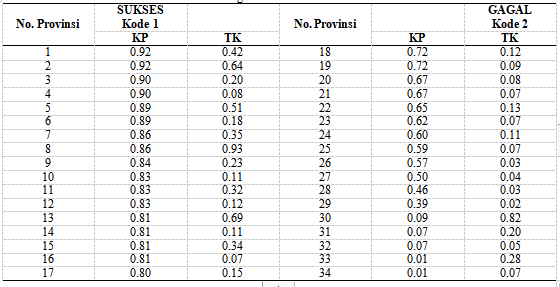Pengategorian Provinsi Berdasarkan Kelompok Sukses dan Gagal dalam Penanganan Pandemik Covid-19 di Indonesia Menurut Analisis Diskriminan
Main Article Content
Abstract
An assessment of categorizing the handling of Covid-19 by the Regional Government is needed, this categorization includes the handling performance (KP) and the death rate (TK) of Covid-19. This was done to see how serious the local government is in handling Covid-19. The approach in this study uses a descriptive approach, this approach aims to describe or describe the categorization of provinces based on groups that have succeeded and failed in handling the Covid-19 pandemic in Indonesia. In this research, the method used is quantitative method. The quantitative approach used is discriminant analysis. The conclusion of this study is that the discriminant function formed in this study is Z = 0.893 KP + 0.451 TK. The results of eigenvalues in this study indicate that the magnitude of Canonical Correlation is 0.797 or the amount of Square Canonical Correlation (CR2) = (0.797) 2 or equal to 0.635. So it can be concluded that 63.5% of the variation between groups of successful and failed provinces can be explained by the discriminant variables of the KP and TK ratios. The view of the matrix structure in this study shows that the amount of loading for KP is 0.842 and the amount of loading for TK is 0.332. The two variables of the Covid 19 handling ratio are high enough so that the discriminant score can be interpreted as a measure of the success of the handling of Covid 19 at the Provincial Government. Meanwhile, the results of the classification matrix show that 32 observations have been classified correctly and only two observations are classified incorrectly, namely the observations number 18 and 19, so the classification accuracy is (32/34) or 94.1%.
Article Details
Section
How to Cite
References
Zahrotunnimah, “Langkah taktis pemerintah daerah dalam pencegahan penyebaran virus corona Covid-19 di Indonesia,” SALAM: Jurnal Sosial & Budaya Syar-i, vol. 7, no. 3, pp. 247-260, 2020, doi: https://doi.org/10.15408/sjsbs.v7i3.15103.
Yuliana, “Corona virus diseases (Covid-19): sebuah tinjauan literatur,” Jurnal Wellness and Healthy Magazine, vol. 2, no. 1, pp. 188-197, 2020, https://doi.org/10.30604/well.95212020.
A. Nurfurqon, “Analisis kebijakan pemerintah daerah dalam penanganan Covid-19: perspektif hukum administrasi,” Jurnal Yustika: Media Hukum dan Keadilan, vol. 23, no. 01, pp. 13-23, 2020, doi: https://doi.org/10.24123/yustika.v23i01.2864.
Muhyiddin, “Covid-19, New Normal dan perencanaan pembangunan di Indonesia,” The Indonesian Journal of Development Planning, vol. 4, no. 2, pp. 240-252, 2020, doi: https://doi.org/10.36574/jpp.v4i2.118.
A. R.I. Susanto, dkk, Kajian Politik Hukum Pemerintah dalam Penanganan Pandemi Covid 19, Yogyakarta: Dewan Mahasiswa Justicia Fakultas Hukum UGM, 2020.
I. I. Seputra, “Pengaruh implementasi kebijakan terhadap efektivitas penanggulangan Covid-19 oleh pemerintah daerah Kabupaten Kerinci,” NUSANTARA: Jurnal Ilmu Pengetahuan Sosial, vol. 7, no. 2, pp. 408-420, 2020, doi: http://dx.doi.org/10.31604/jips.v7i2.2020.408-420.
Kemensesneg, Keputusan Presiden Nomor 11 Tahun 2020 tentang Penetapan Kedaruratan Kesehatan Kemasyarakatan, Jakarta: Kemensesneg, 2020.
E. P. E. Wijana, Sultan Tetapkan DIY Berstatus Tanggap Darurat Bencana Covid-19, diakses dari: https://jogja.suara.com/read/2020/03/20/152353/sultan-tetapkan-diy-berstatus-tanggap-darurat-bencana-covid-19 tanggal 16 April 2020.
Gubernur DKI Jakarta, Seruan Gubernur Daerah Khusus Ibukota Jakarta Nomor 6 Tahun 2020 Penghentian Sementara Kegiatan Perkantoran dalam Rangka Mencegah Penyebaran Wabah Covid-19, Jakarta: Kantor Gubernur DKI, 20 Maret 2020.
Kemensesneg, Undang-Undang Nomor 23 Tahun 2014 tentang Pemerintahan Daerah (Lembaran Negara No. 244, Tambahan Lembaran Negara No. 5587), Jakarta: Kemensesneg, 2014.
I. N. Juaningsih, Y. Consuello, A, Tarmidzi dan D. NurIrfan, “Optimalisasi kebijakan pemerintah dalam penanganan Covid-19 terhadap masyarakat Indonesia,” SALAM: Jurnal Sosial & Budaya Syar-i, vol. 7, no. 6, pp. 509-518, 2020, doi: https://doi.org/10.15408/sjsbs.v7i6.15363.
I. K. Wiargitha, “Modifikasi pembelajaran PPDS-1 ilmu bedah Fakultas Kedokteran Universitas Udayana dalam Masa Pandemi COVID-19,” Jurnal Bedah Nasional (Special Issue COVID-19), vol. 4, no. 1, 2020, doi: https://doi.org/10.24843/JBN.2020.v04.is01.p02.
D. G. Andiraharja, “Peran pemerintah daerah pada penanganan COVID-19,” Jurnal Politik Pemerintahan Dharma Praja (JPPDP), vol. 3, no. 1, pp. 52-68, 2020, doi: https://doi.org/10.33701/jppdp.v13i1.1005.
R. Atmasasmita, Hukum Kejahatan Bisnis Teori dan Praktik di Era Globalisasi, Jakarta: Prenadamedia, 2014.
I. Ghozali, Aplikasi Analisis Multivariate dengan Program IBM SPSS 21, Semarang: Badan Penerbit Universitas Diponegoro, 2013.
F. Lukiastuti, & M. Hamdani, Statistika Non Parametris: Aplikasinya dalam Bidang Ekonomi dan Bisnis, Yogyakarta: CAPS, 2012.
Sumanto, Statistika Terapan, Yogyakarta: CAPS, 2014.

